Business Environment Report: Culture, Partnership, and Business
VerifiedAdded on 2023/01/04
|22
|5209
|94
Report
AI Summary
This report examines the business environment, particularly focusing on the partnership between Wakatu Corporation of New Zealand and Royal Supermarket of China. It delves into the significance of the Treaty of Waitangi, its role in the New Zealand constitution, and conflicting interpretations, including multiculturalism. The report analyzes the application of the Treaty's principles in business relationships, exploring concepts of partnership, participation, and protection. It further investigates strategies for good business relationships, considering national culture, organizational operations, Hofstede’s cultural dimensions, and communication differences between Wakatu and Royal Supermarket. The report emphasizes the importance of innovation, integrity, and cultural diversity in fostering successful business ventures, providing insights into building strong and effective partnerships in a globalized business landscape.
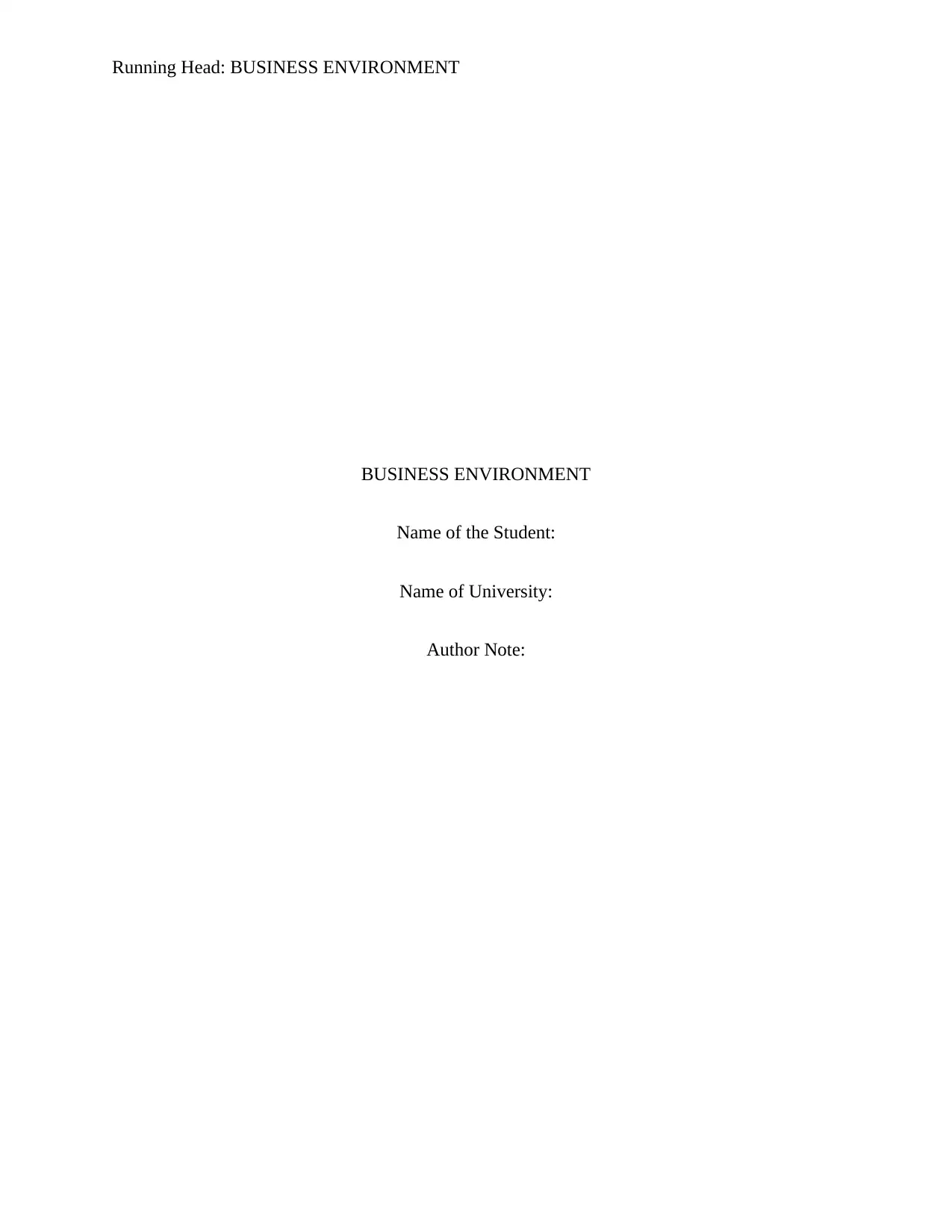
Running Head: BUSINESS ENVIRONMENT
BUSINESS ENVIRONMENT
Name of the Student:
Name of University:
Author Note:
BUSINESS ENVIRONMENT
Name of the Student:
Name of University:
Author Note:
Paraphrase This Document
Need a fresh take? Get an instant paraphrase of this document with our AI Paraphraser
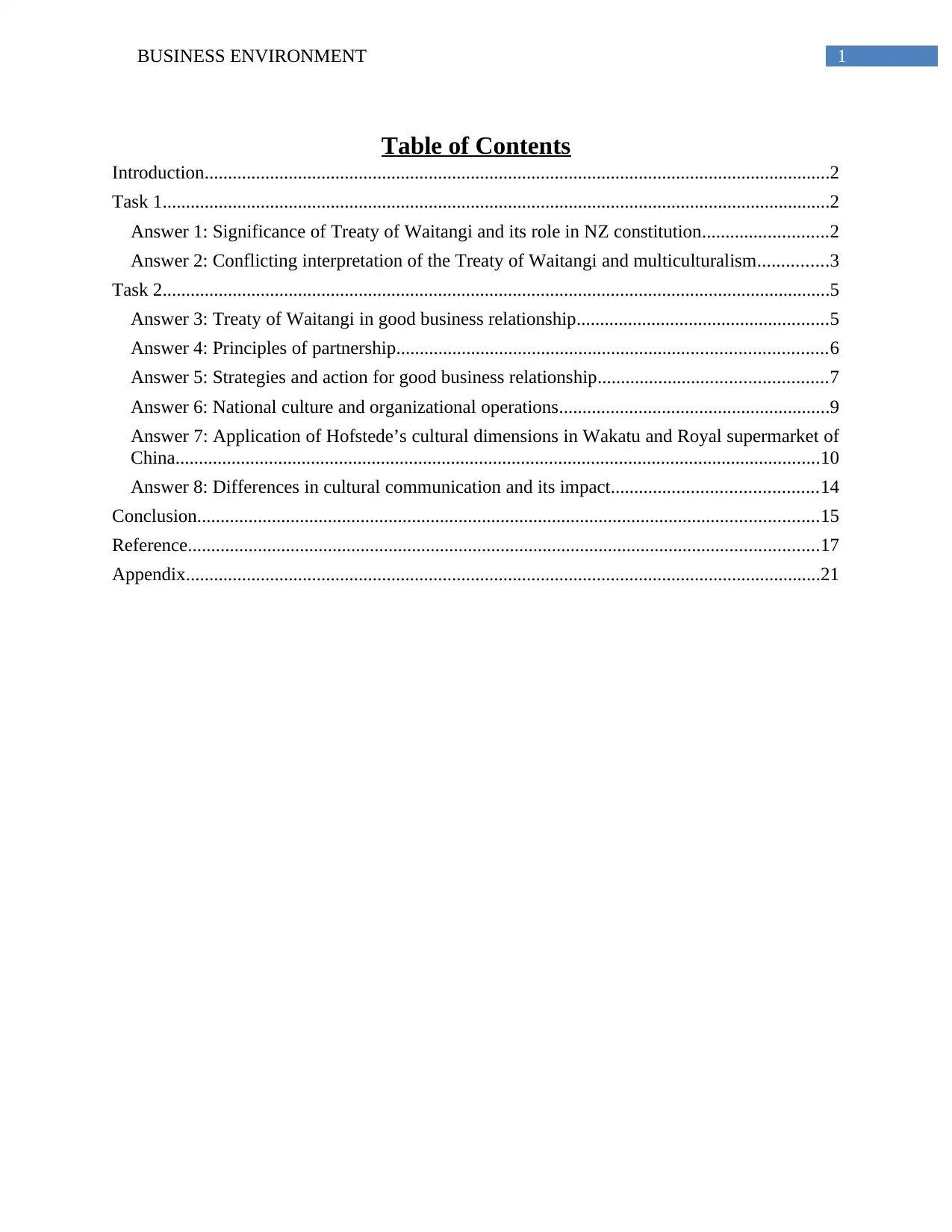
1BUSINESS ENVIRONMENT
Table of Contents
Introduction......................................................................................................................................2
Task 1...............................................................................................................................................2
Answer 1: Significance of Treaty of Waitangi and its role in NZ constitution...........................2
Answer 2: Conflicting interpretation of the Treaty of Waitangi and multiculturalism...............3
Task 2...............................................................................................................................................5
Answer 3: Treaty of Waitangi in good business relationship......................................................5
Answer 4: Principles of partnership............................................................................................6
Answer 5: Strategies and action for good business relationship.................................................7
Answer 6: National culture and organizational operations..........................................................9
Answer 7: Application of Hofstede’s cultural dimensions in Wakatu and Royal supermarket of
China..........................................................................................................................................10
Answer 8: Differences in cultural communication and its impact............................................14
Conclusion.....................................................................................................................................15
Reference.......................................................................................................................................17
Appendix........................................................................................................................................21
Table of Contents
Introduction......................................................................................................................................2
Task 1...............................................................................................................................................2
Answer 1: Significance of Treaty of Waitangi and its role in NZ constitution...........................2
Answer 2: Conflicting interpretation of the Treaty of Waitangi and multiculturalism...............3
Task 2...............................................................................................................................................5
Answer 3: Treaty of Waitangi in good business relationship......................................................5
Answer 4: Principles of partnership............................................................................................6
Answer 5: Strategies and action for good business relationship.................................................7
Answer 6: National culture and organizational operations..........................................................9
Answer 7: Application of Hofstede’s cultural dimensions in Wakatu and Royal supermarket of
China..........................................................................................................................................10
Answer 8: Differences in cultural communication and its impact............................................14
Conclusion.....................................................................................................................................15
Reference.......................................................................................................................................17
Appendix........................................................................................................................................21
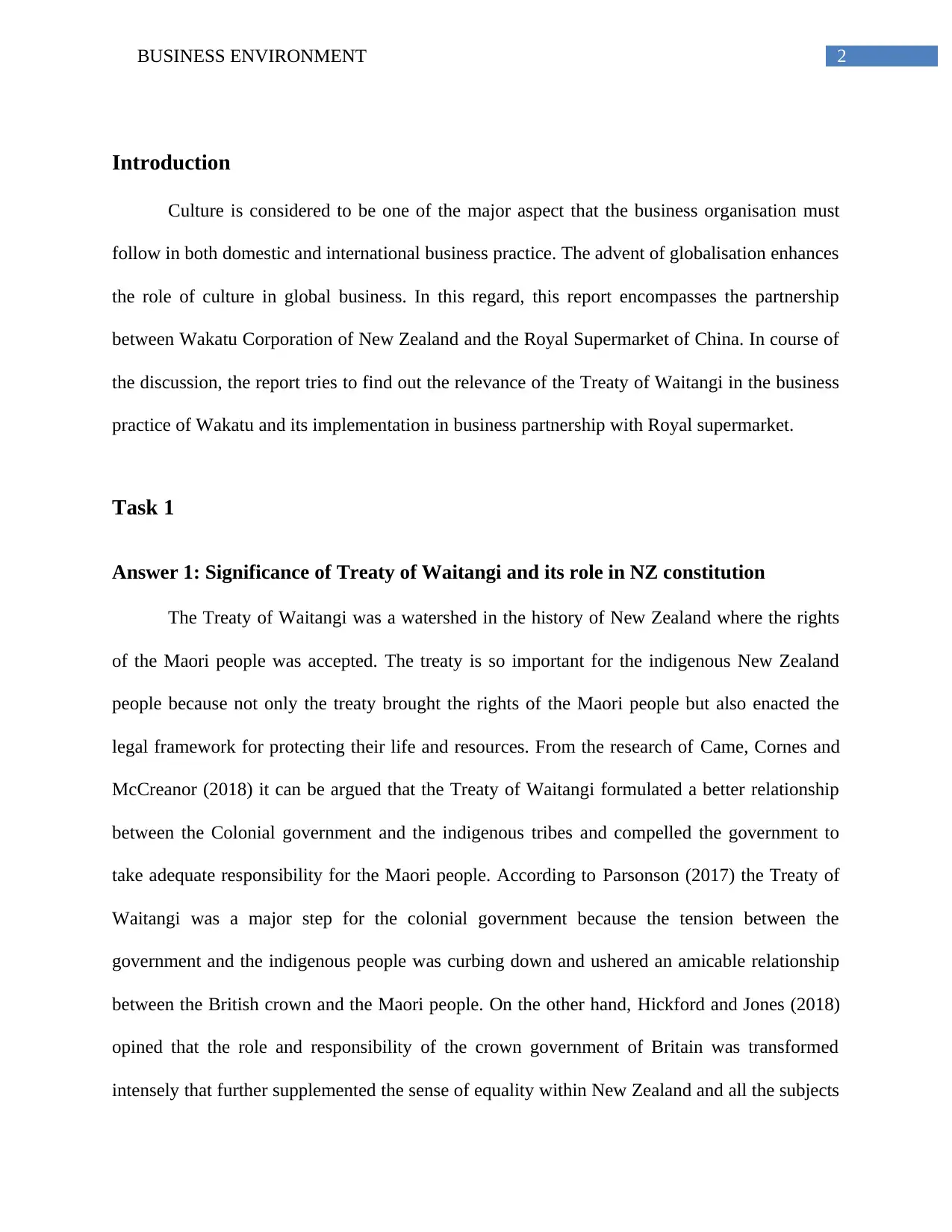
2BUSINESS ENVIRONMENT
Introduction
Culture is considered to be one of the major aspect that the business organisation must
follow in both domestic and international business practice. The advent of globalisation enhances
the role of culture in global business. In this regard, this report encompasses the partnership
between Wakatu Corporation of New Zealand and the Royal Supermarket of China. In course of
the discussion, the report tries to find out the relevance of the Treaty of Waitangi in the business
practice of Wakatu and its implementation in business partnership with Royal supermarket.
Task 1
Answer 1: Significance of Treaty of Waitangi and its role in NZ constitution
The Treaty of Waitangi was a watershed in the history of New Zealand where the rights
of the Maori people was accepted. The treaty is so important for the indigenous New Zealand
people because not only the treaty brought the rights of the Maori people but also enacted the
legal framework for protecting their life and resources. From the research of Came, Cornes and
McCreanor (2018) it can be argued that the Treaty of Waitangi formulated a better relationship
between the Colonial government and the indigenous tribes and compelled the government to
take adequate responsibility for the Maori people. According to Parsonson (2017) the Treaty of
Waitangi was a major step for the colonial government because the tension between the
government and the indigenous people was curbing down and ushered an amicable relationship
between the British crown and the Maori people. On the other hand, Hickford and Jones (2018)
opined that the role and responsibility of the crown government of Britain was transformed
intensely that further supplemented the sense of equality within New Zealand and all the subjects
Introduction
Culture is considered to be one of the major aspect that the business organisation must
follow in both domestic and international business practice. The advent of globalisation enhances
the role of culture in global business. In this regard, this report encompasses the partnership
between Wakatu Corporation of New Zealand and the Royal Supermarket of China. In course of
the discussion, the report tries to find out the relevance of the Treaty of Waitangi in the business
practice of Wakatu and its implementation in business partnership with Royal supermarket.
Task 1
Answer 1: Significance of Treaty of Waitangi and its role in NZ constitution
The Treaty of Waitangi was a watershed in the history of New Zealand where the rights
of the Maori people was accepted. The treaty is so important for the indigenous New Zealand
people because not only the treaty brought the rights of the Maori people but also enacted the
legal framework for protecting their life and resources. From the research of Came, Cornes and
McCreanor (2018) it can be argued that the Treaty of Waitangi formulated a better relationship
between the Colonial government and the indigenous tribes and compelled the government to
take adequate responsibility for the Maori people. According to Parsonson (2017) the Treaty of
Waitangi was a major step for the colonial government because the tension between the
government and the indigenous people was curbing down and ushered an amicable relationship
between the British crown and the Maori people. On the other hand, Hickford and Jones (2018)
opined that the role and responsibility of the crown government of Britain was transformed
intensely that further supplemented the sense of equality within New Zealand and all the subjects
⊘ This is a preview!⊘
Do you want full access?
Subscribe today to unlock all pages.

Trusted by 1+ million students worldwide
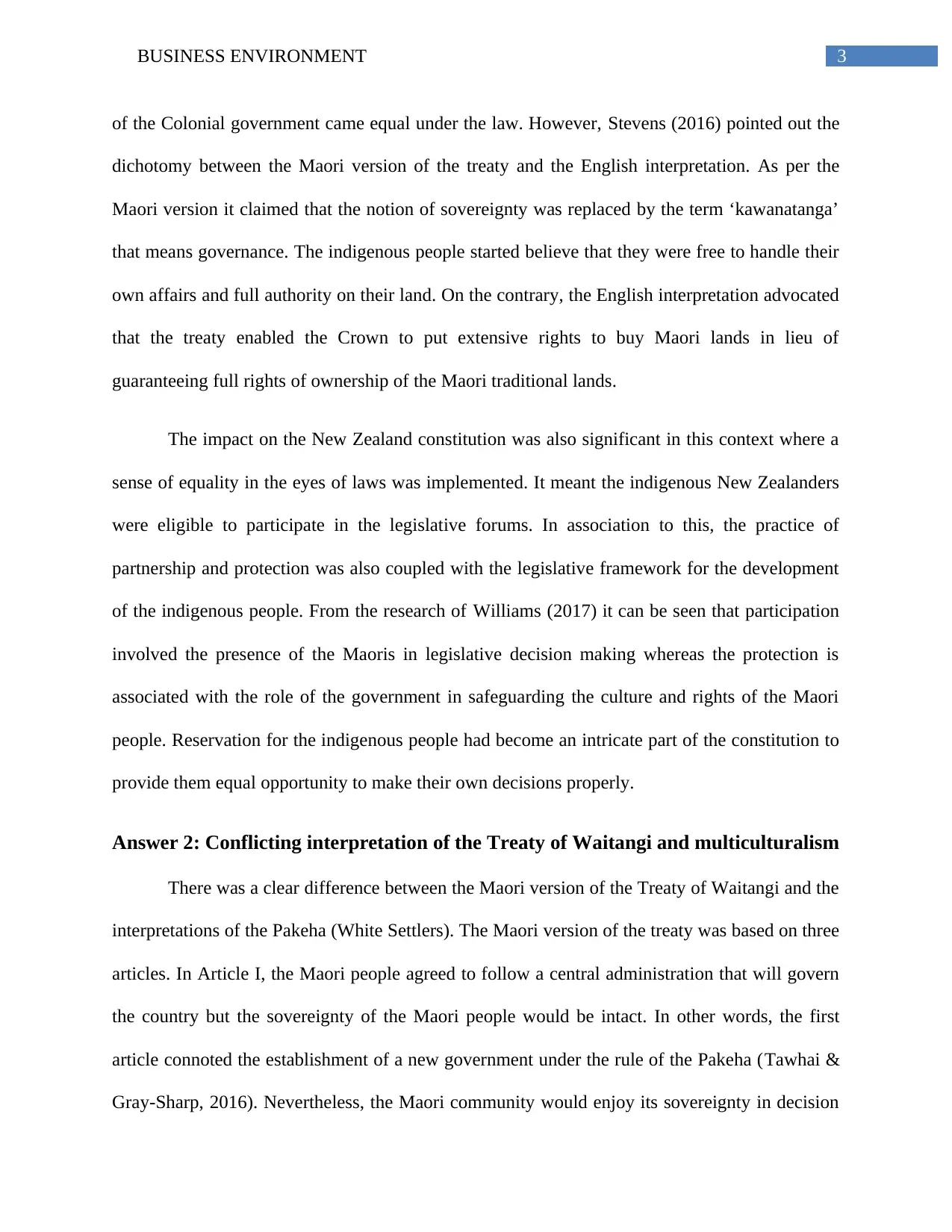
3BUSINESS ENVIRONMENT
of the Colonial government came equal under the law. However, Stevens (2016) pointed out the
dichotomy between the Maori version of the treaty and the English interpretation. As per the
Maori version it claimed that the notion of sovereignty was replaced by the term ‘kawanatanga’
that means governance. The indigenous people started believe that they were free to handle their
own affairs and full authority on their land. On the contrary, the English interpretation advocated
that the treaty enabled the Crown to put extensive rights to buy Maori lands in lieu of
guaranteeing full rights of ownership of the Maori traditional lands.
The impact on the New Zealand constitution was also significant in this context where a
sense of equality in the eyes of laws was implemented. It meant the indigenous New Zealanders
were eligible to participate in the legislative forums. In association to this, the practice of
partnership and protection was also coupled with the legislative framework for the development
of the indigenous people. From the research of Williams (2017) it can be seen that participation
involved the presence of the Maoris in legislative decision making whereas the protection is
associated with the role of the government in safeguarding the culture and rights of the Maori
people. Reservation for the indigenous people had become an intricate part of the constitution to
provide them equal opportunity to make their own decisions properly.
Answer 2: Conflicting interpretation of the Treaty of Waitangi and multiculturalism
There was a clear difference between the Maori version of the Treaty of Waitangi and the
interpretations of the Pakeha (White Settlers). The Maori version of the treaty was based on three
articles. In Article I, the Maori people agreed to follow a central administration that will govern
the country but the sovereignty of the Maori people would be intact. In other words, the first
article connoted the establishment of a new government under the rule of the Pakeha (Tawhai &
Gray-Sharp, 2016). Nevertheless, the Maori community would enjoy its sovereignty in decision
of the Colonial government came equal under the law. However, Stevens (2016) pointed out the
dichotomy between the Maori version of the treaty and the English interpretation. As per the
Maori version it claimed that the notion of sovereignty was replaced by the term ‘kawanatanga’
that means governance. The indigenous people started believe that they were free to handle their
own affairs and full authority on their land. On the contrary, the English interpretation advocated
that the treaty enabled the Crown to put extensive rights to buy Maori lands in lieu of
guaranteeing full rights of ownership of the Maori traditional lands.
The impact on the New Zealand constitution was also significant in this context where a
sense of equality in the eyes of laws was implemented. It meant the indigenous New Zealanders
were eligible to participate in the legislative forums. In association to this, the practice of
partnership and protection was also coupled with the legislative framework for the development
of the indigenous people. From the research of Williams (2017) it can be seen that participation
involved the presence of the Maoris in legislative decision making whereas the protection is
associated with the role of the government in safeguarding the culture and rights of the Maori
people. Reservation for the indigenous people had become an intricate part of the constitution to
provide them equal opportunity to make their own decisions properly.
Answer 2: Conflicting interpretation of the Treaty of Waitangi and multiculturalism
There was a clear difference between the Maori version of the Treaty of Waitangi and the
interpretations of the Pakeha (White Settlers). The Maori version of the treaty was based on three
articles. In Article I, the Maori people agreed to follow a central administration that will govern
the country but the sovereignty of the Maori people would be intact. In other words, the first
article connoted the establishment of a new government under the rule of the Pakeha (Tawhai &
Gray-Sharp, 2016). Nevertheless, the Maori community would enjoy its sovereignty in decision
Paraphrase This Document
Need a fresh take? Get an instant paraphrase of this document with our AI Paraphraser
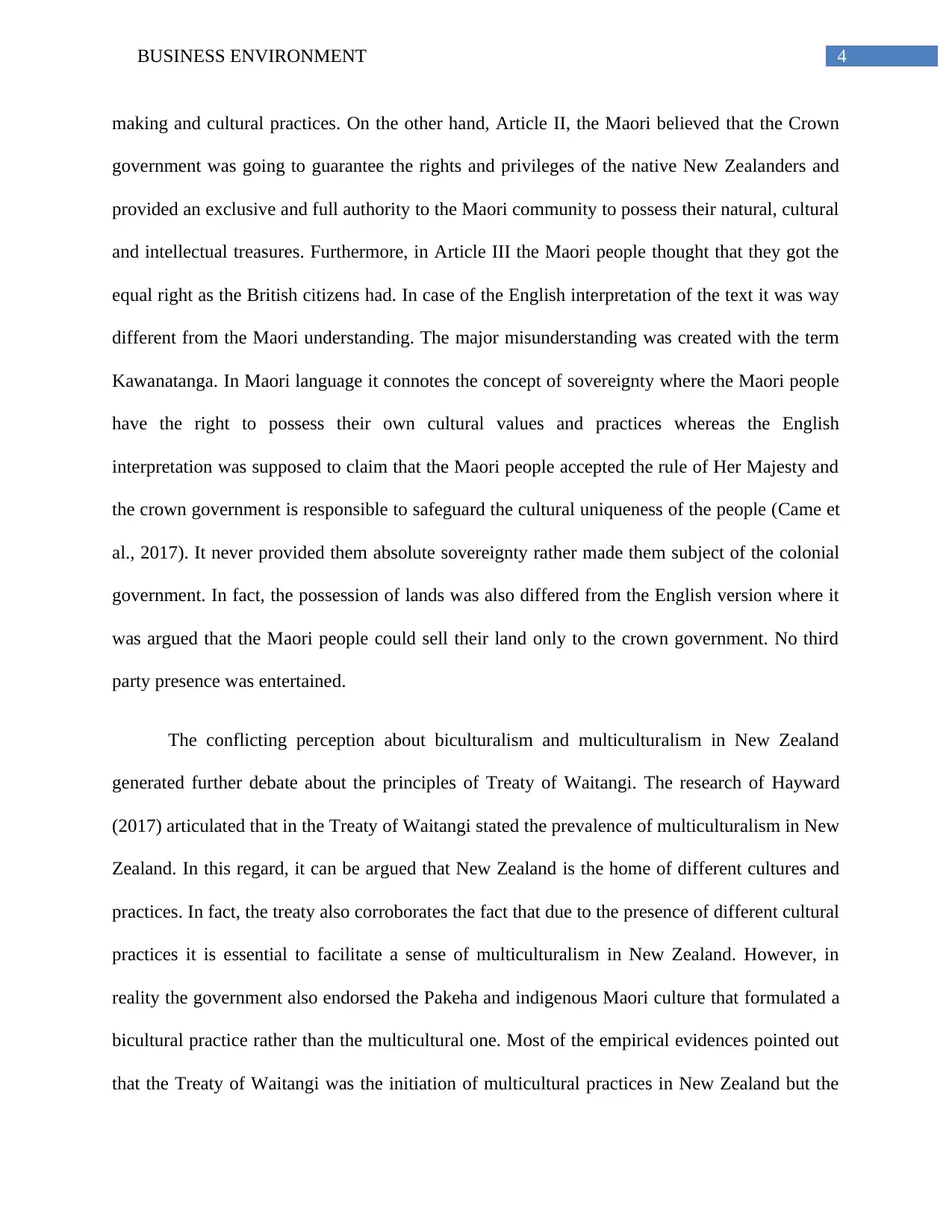
4BUSINESS ENVIRONMENT
making and cultural practices. On the other hand, Article II, the Maori believed that the Crown
government was going to guarantee the rights and privileges of the native New Zealanders and
provided an exclusive and full authority to the Maori community to possess their natural, cultural
and intellectual treasures. Furthermore, in Article III the Maori people thought that they got the
equal right as the British citizens had. In case of the English interpretation of the text it was way
different from the Maori understanding. The major misunderstanding was created with the term
Kawanatanga. In Maori language it connotes the concept of sovereignty where the Maori people
have the right to possess their own cultural values and practices whereas the English
interpretation was supposed to claim that the Maori people accepted the rule of Her Majesty and
the crown government is responsible to safeguard the cultural uniqueness of the people (Came et
al., 2017). It never provided them absolute sovereignty rather made them subject of the colonial
government. In fact, the possession of lands was also differed from the English version where it
was argued that the Maori people could sell their land only to the crown government. No third
party presence was entertained.
The conflicting perception about biculturalism and multiculturalism in New Zealand
generated further debate about the principles of Treaty of Waitangi. The research of Hayward
(2017) articulated that in the Treaty of Waitangi stated the prevalence of multiculturalism in New
Zealand. In this regard, it can be argued that New Zealand is the home of different cultures and
practices. In fact, the treaty also corroborates the fact that due to the presence of different cultural
practices it is essential to facilitate a sense of multiculturalism in New Zealand. However, in
reality the government also endorsed the Pakeha and indigenous Maori culture that formulated a
bicultural practice rather than the multicultural one. Most of the empirical evidences pointed out
that the Treaty of Waitangi was the initiation of multicultural practices in New Zealand but the
making and cultural practices. On the other hand, Article II, the Maori believed that the Crown
government was going to guarantee the rights and privileges of the native New Zealanders and
provided an exclusive and full authority to the Maori community to possess their natural, cultural
and intellectual treasures. Furthermore, in Article III the Maori people thought that they got the
equal right as the British citizens had. In case of the English interpretation of the text it was way
different from the Maori understanding. The major misunderstanding was created with the term
Kawanatanga. In Maori language it connotes the concept of sovereignty where the Maori people
have the right to possess their own cultural values and practices whereas the English
interpretation was supposed to claim that the Maori people accepted the rule of Her Majesty and
the crown government is responsible to safeguard the cultural uniqueness of the people (Came et
al., 2017). It never provided them absolute sovereignty rather made them subject of the colonial
government. In fact, the possession of lands was also differed from the English version where it
was argued that the Maori people could sell their land only to the crown government. No third
party presence was entertained.
The conflicting perception about biculturalism and multiculturalism in New Zealand
generated further debate about the principles of Treaty of Waitangi. The research of Hayward
(2017) articulated that in the Treaty of Waitangi stated the prevalence of multiculturalism in New
Zealand. In this regard, it can be argued that New Zealand is the home of different cultures and
practices. In fact, the treaty also corroborates the fact that due to the presence of different cultural
practices it is essential to facilitate a sense of multiculturalism in New Zealand. However, in
reality the government also endorsed the Pakeha and indigenous Maori culture that formulated a
bicultural practice rather than the multicultural one. Most of the empirical evidences pointed out
that the Treaty of Waitangi was the initiation of multicultural practices in New Zealand but the
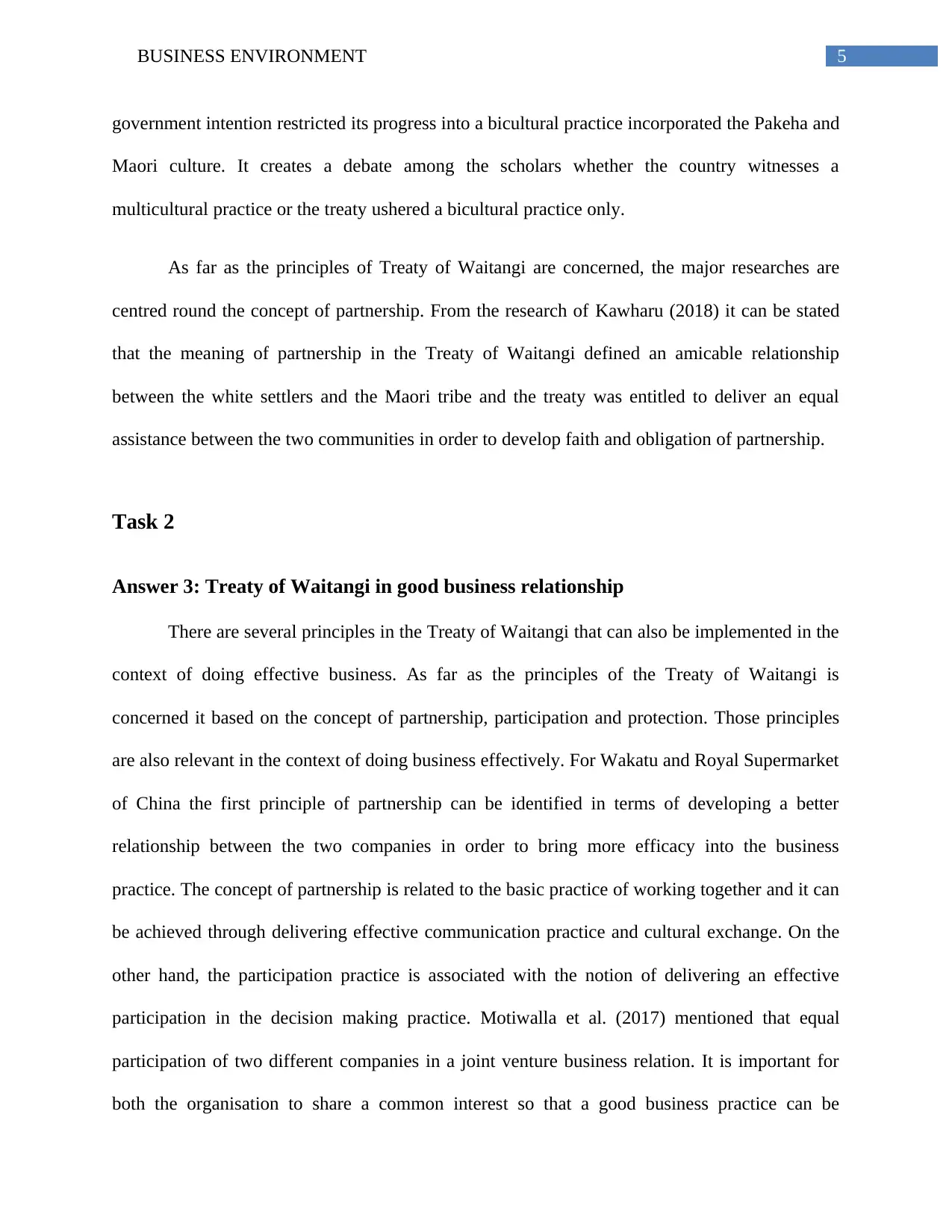
5BUSINESS ENVIRONMENT
government intention restricted its progress into a bicultural practice incorporated the Pakeha and
Maori culture. It creates a debate among the scholars whether the country witnesses a
multicultural practice or the treaty ushered a bicultural practice only.
As far as the principles of Treaty of Waitangi are concerned, the major researches are
centred round the concept of partnership. From the research of Kawharu (2018) it can be stated
that the meaning of partnership in the Treaty of Waitangi defined an amicable relationship
between the white settlers and the Maori tribe and the treaty was entitled to deliver an equal
assistance between the two communities in order to develop faith and obligation of partnership.
Task 2
Answer 3: Treaty of Waitangi in good business relationship
There are several principles in the Treaty of Waitangi that can also be implemented in the
context of doing effective business. As far as the principles of the Treaty of Waitangi is
concerned it based on the concept of partnership, participation and protection. Those principles
are also relevant in the context of doing business effectively. For Wakatu and Royal Supermarket
of China the first principle of partnership can be identified in terms of developing a better
relationship between the two companies in order to bring more efficacy into the business
practice. The concept of partnership is related to the basic practice of working together and it can
be achieved through delivering effective communication practice and cultural exchange. On the
other hand, the participation practice is associated with the notion of delivering an effective
participation in the decision making practice. Motiwalla et al. (2017) mentioned that equal
participation of two different companies in a joint venture business relation. It is important for
both the organisation to share a common interest so that a good business practice can be
government intention restricted its progress into a bicultural practice incorporated the Pakeha and
Maori culture. It creates a debate among the scholars whether the country witnesses a
multicultural practice or the treaty ushered a bicultural practice only.
As far as the principles of Treaty of Waitangi are concerned, the major researches are
centred round the concept of partnership. From the research of Kawharu (2018) it can be stated
that the meaning of partnership in the Treaty of Waitangi defined an amicable relationship
between the white settlers and the Maori tribe and the treaty was entitled to deliver an equal
assistance between the two communities in order to develop faith and obligation of partnership.
Task 2
Answer 3: Treaty of Waitangi in good business relationship
There are several principles in the Treaty of Waitangi that can also be implemented in the
context of doing effective business. As far as the principles of the Treaty of Waitangi is
concerned it based on the concept of partnership, participation and protection. Those principles
are also relevant in the context of doing business effectively. For Wakatu and Royal Supermarket
of China the first principle of partnership can be identified in terms of developing a better
relationship between the two companies in order to bring more efficacy into the business
practice. The concept of partnership is related to the basic practice of working together and it can
be achieved through delivering effective communication practice and cultural exchange. On the
other hand, the participation practice is associated with the notion of delivering an effective
participation in the decision making practice. Motiwalla et al. (2017) mentioned that equal
participation of two different companies in a joint venture business relation. It is important for
both the organisation to share a common interest so that a good business practice can be
⊘ This is a preview!⊘
Do you want full access?
Subscribe today to unlock all pages.

Trusted by 1+ million students worldwide
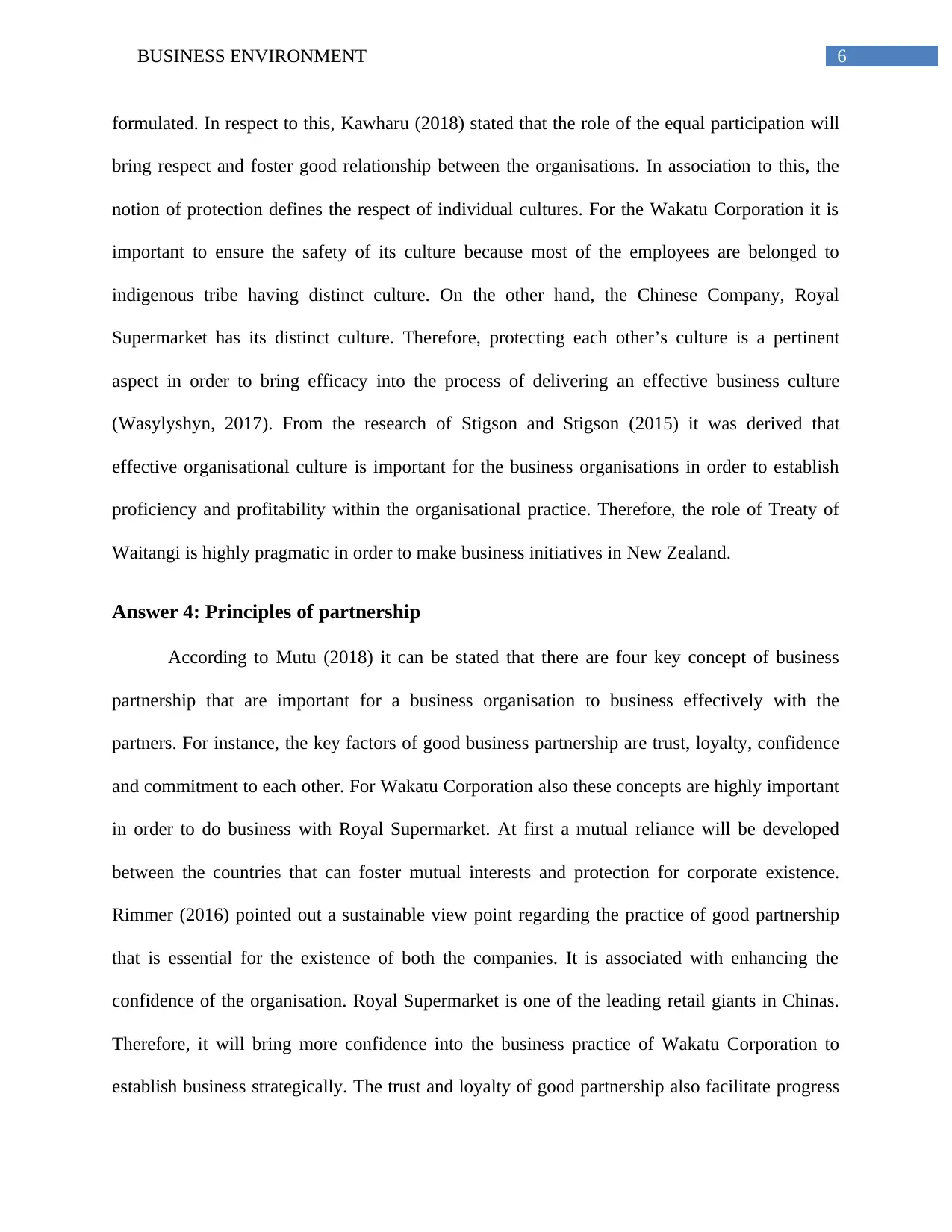
6BUSINESS ENVIRONMENT
formulated. In respect to this, Kawharu (2018) stated that the role of the equal participation will
bring respect and foster good relationship between the organisations. In association to this, the
notion of protection defines the respect of individual cultures. For the Wakatu Corporation it is
important to ensure the safety of its culture because most of the employees are belonged to
indigenous tribe having distinct culture. On the other hand, the Chinese Company, Royal
Supermarket has its distinct culture. Therefore, protecting each other’s culture is a pertinent
aspect in order to bring efficacy into the process of delivering an effective business culture
(Wasylyshyn, 2017). From the research of Stigson and Stigson (2015) it was derived that
effective organisational culture is important for the business organisations in order to establish
proficiency and profitability within the organisational practice. Therefore, the role of Treaty of
Waitangi is highly pragmatic in order to make business initiatives in New Zealand.
Answer 4: Principles of partnership
According to Mutu (2018) it can be stated that there are four key concept of business
partnership that are important for a business organisation to business effectively with the
partners. For instance, the key factors of good business partnership are trust, loyalty, confidence
and commitment to each other. For Wakatu Corporation also these concepts are highly important
in order to do business with Royal Supermarket. At first a mutual reliance will be developed
between the countries that can foster mutual interests and protection for corporate existence.
Rimmer (2016) pointed out a sustainable view point regarding the practice of good partnership
that is essential for the existence of both the companies. It is associated with enhancing the
confidence of the organisation. Royal Supermarket is one of the leading retail giants in Chinas.
Therefore, it will bring more confidence into the business practice of Wakatu Corporation to
establish business strategically. The trust and loyalty of good partnership also facilitate progress
formulated. In respect to this, Kawharu (2018) stated that the role of the equal participation will
bring respect and foster good relationship between the organisations. In association to this, the
notion of protection defines the respect of individual cultures. For the Wakatu Corporation it is
important to ensure the safety of its culture because most of the employees are belonged to
indigenous tribe having distinct culture. On the other hand, the Chinese Company, Royal
Supermarket has its distinct culture. Therefore, protecting each other’s culture is a pertinent
aspect in order to bring efficacy into the process of delivering an effective business culture
(Wasylyshyn, 2017). From the research of Stigson and Stigson (2015) it was derived that
effective organisational culture is important for the business organisations in order to establish
proficiency and profitability within the organisational practice. Therefore, the role of Treaty of
Waitangi is highly pragmatic in order to make business initiatives in New Zealand.
Answer 4: Principles of partnership
According to Mutu (2018) it can be stated that there are four key concept of business
partnership that are important for a business organisation to business effectively with the
partners. For instance, the key factors of good business partnership are trust, loyalty, confidence
and commitment to each other. For Wakatu Corporation also these concepts are highly important
in order to do business with Royal Supermarket. At first a mutual reliance will be developed
between the countries that can foster mutual interests and protection for corporate existence.
Rimmer (2016) pointed out a sustainable view point regarding the practice of good partnership
that is essential for the existence of both the companies. It is associated with enhancing the
confidence of the organisation. Royal Supermarket is one of the leading retail giants in Chinas.
Therefore, it will bring more confidence into the business practice of Wakatu Corporation to
establish business strategically. The trust and loyalty of good partnership also facilitate progress
Paraphrase This Document
Need a fresh take? Get an instant paraphrase of this document with our AI Paraphraser
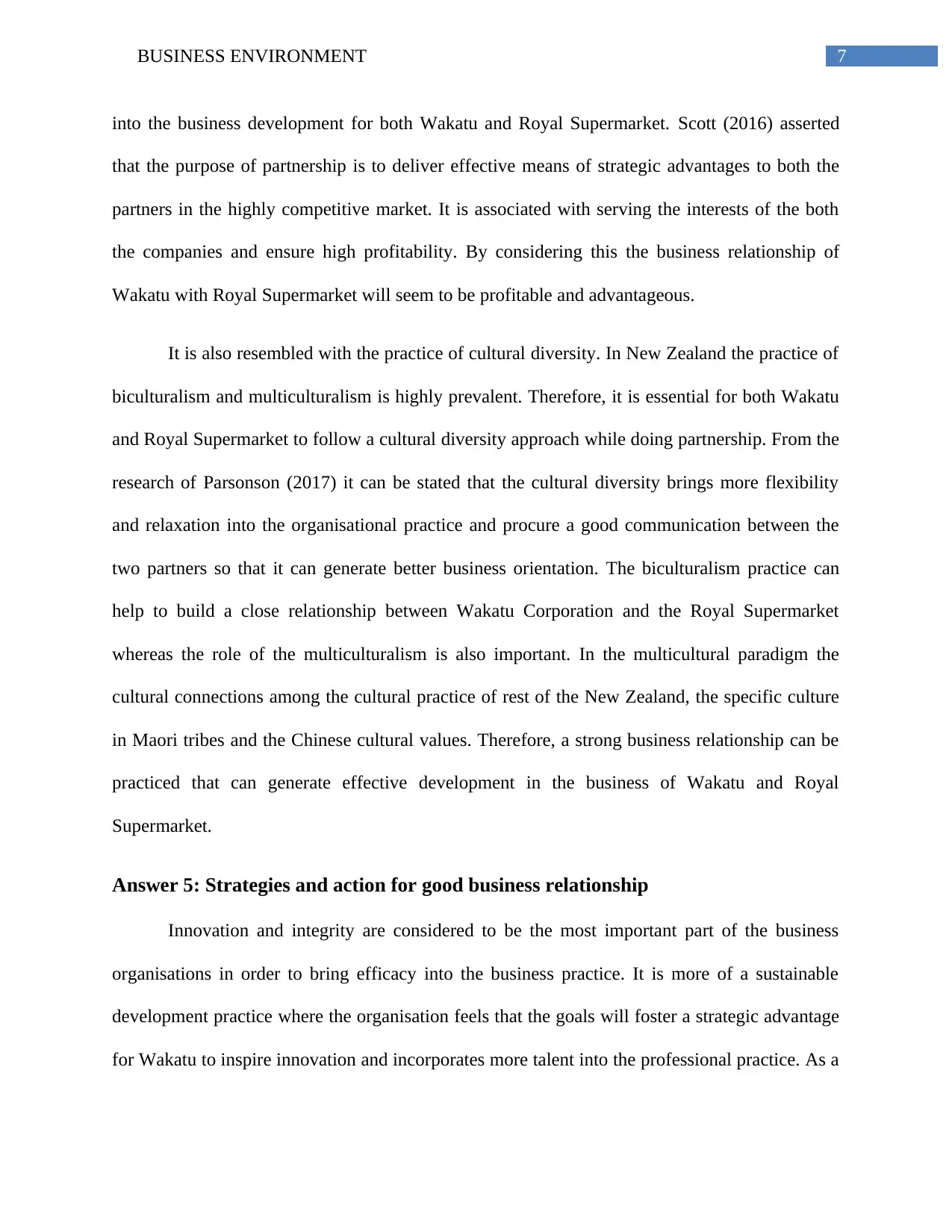
7BUSINESS ENVIRONMENT
into the business development for both Wakatu and Royal Supermarket. Scott (2016) asserted
that the purpose of partnership is to deliver effective means of strategic advantages to both the
partners in the highly competitive market. It is associated with serving the interests of the both
the companies and ensure high profitability. By considering this the business relationship of
Wakatu with Royal Supermarket will seem to be profitable and advantageous.
It is also resembled with the practice of cultural diversity. In New Zealand the practice of
biculturalism and multiculturalism is highly prevalent. Therefore, it is essential for both Wakatu
and Royal Supermarket to follow a cultural diversity approach while doing partnership. From the
research of Parsonson (2017) it can be stated that the cultural diversity brings more flexibility
and relaxation into the organisational practice and procure a good communication between the
two partners so that it can generate better business orientation. The biculturalism practice can
help to build a close relationship between Wakatu Corporation and the Royal Supermarket
whereas the role of the multiculturalism is also important. In the multicultural paradigm the
cultural connections among the cultural practice of rest of the New Zealand, the specific culture
in Maori tribes and the Chinese cultural values. Therefore, a strong business relationship can be
practiced that can generate effective development in the business of Wakatu and Royal
Supermarket.
Answer 5: Strategies and action for good business relationship
Innovation and integrity are considered to be the most important part of the business
organisations in order to bring efficacy into the business practice. It is more of a sustainable
development practice where the organisation feels that the goals will foster a strategic advantage
for Wakatu to inspire innovation and incorporates more talent into the professional practice. As a
into the business development for both Wakatu and Royal Supermarket. Scott (2016) asserted
that the purpose of partnership is to deliver effective means of strategic advantages to both the
partners in the highly competitive market. It is associated with serving the interests of the both
the companies and ensure high profitability. By considering this the business relationship of
Wakatu with Royal Supermarket will seem to be profitable and advantageous.
It is also resembled with the practice of cultural diversity. In New Zealand the practice of
biculturalism and multiculturalism is highly prevalent. Therefore, it is essential for both Wakatu
and Royal Supermarket to follow a cultural diversity approach while doing partnership. From the
research of Parsonson (2017) it can be stated that the cultural diversity brings more flexibility
and relaxation into the organisational practice and procure a good communication between the
two partners so that it can generate better business orientation. The biculturalism practice can
help to build a close relationship between Wakatu Corporation and the Royal Supermarket
whereas the role of the multiculturalism is also important. In the multicultural paradigm the
cultural connections among the cultural practice of rest of the New Zealand, the specific culture
in Maori tribes and the Chinese cultural values. Therefore, a strong business relationship can be
practiced that can generate effective development in the business of Wakatu and Royal
Supermarket.
Answer 5: Strategies and action for good business relationship
Innovation and integrity are considered to be the most important part of the business
organisations in order to bring efficacy into the business practice. It is more of a sustainable
development practice where the organisation feels that the goals will foster a strategic advantage
for Wakatu to inspire innovation and incorporates more talent into the professional practice. As a
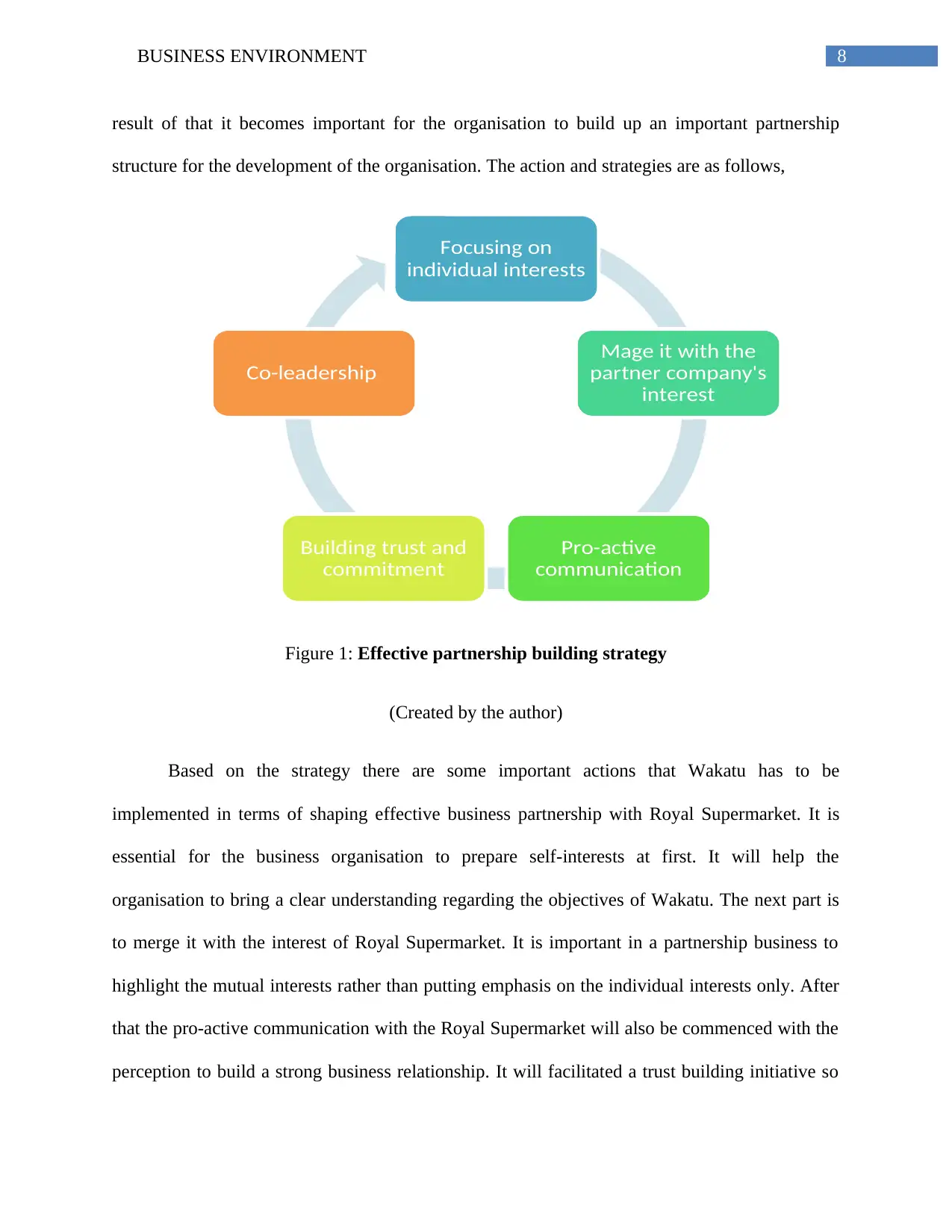
8BUSINESS ENVIRONMENT
result of that it becomes important for the organisation to build up an important partnership
structure for the development of the organisation. The action and strategies are as follows,
Figure 1: Effective partnership building strategy
(Created by the author)
Based on the strategy there are some important actions that Wakatu has to be
implemented in terms of shaping effective business partnership with Royal Supermarket. It is
essential for the business organisation to prepare self-interests at first. It will help the
organisation to bring a clear understanding regarding the objectives of Wakatu. The next part is
to merge it with the interest of Royal Supermarket. It is important in a partnership business to
highlight the mutual interests rather than putting emphasis on the individual interests only. After
that the pro-active communication with the Royal Supermarket will also be commenced with the
perception to build a strong business relationship. It will facilitated a trust building initiative so
Focusing on
individual interests
Mage it with the
partner company's
interest
Pro-active
communication
Building trust and
commitment
Co-leadership
result of that it becomes important for the organisation to build up an important partnership
structure for the development of the organisation. The action and strategies are as follows,
Figure 1: Effective partnership building strategy
(Created by the author)
Based on the strategy there are some important actions that Wakatu has to be
implemented in terms of shaping effective business partnership with Royal Supermarket. It is
essential for the business organisation to prepare self-interests at first. It will help the
organisation to bring a clear understanding regarding the objectives of Wakatu. The next part is
to merge it with the interest of Royal Supermarket. It is important in a partnership business to
highlight the mutual interests rather than putting emphasis on the individual interests only. After
that the pro-active communication with the Royal Supermarket will also be commenced with the
perception to build a strong business relationship. It will facilitated a trust building initiative so
Focusing on
individual interests
Mage it with the
partner company's
interest
Pro-active
communication
Building trust and
commitment
Co-leadership
⊘ This is a preview!⊘
Do you want full access?
Subscribe today to unlock all pages.

Trusted by 1+ million students worldwide
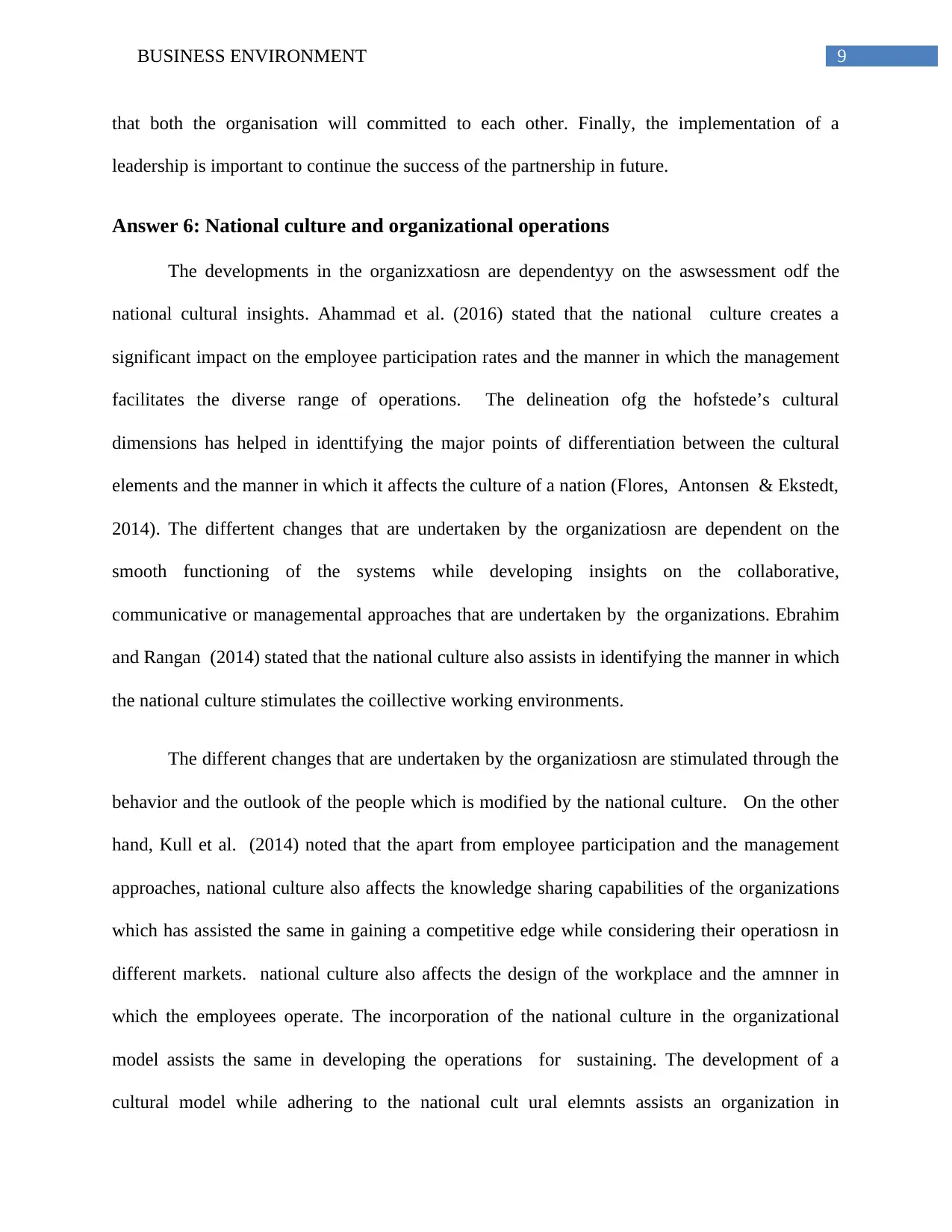
9BUSINESS ENVIRONMENT
that both the organisation will committed to each other. Finally, the implementation of a
leadership is important to continue the success of the partnership in future.
Answer 6: National culture and organizational operations
The developments in the organizxatiosn are dependentyy on the aswsessment odf the
national cultural insights. Ahammad et al. (2016) stated that the national culture creates a
significant impact on the employee participation rates and the manner in which the management
facilitates the diverse range of operations. The delineation ofg the hofstede’s cultural
dimensions has helped in identtifying the major points of differentiation between the cultural
elements and the manner in which it affects the culture of a nation (Flores, Antonsen & Ekstedt,
2014). The differtent changes that are undertaken by the organizatiosn are dependent on the
smooth functioning of the systems while developing insights on the collaborative,
communicative or managemental approaches that are undertaken by the organizations. Ebrahim
and Rangan (2014) stated that the national culture also assists in identifying the manner in which
the national culture stimulates the coillective working environments.
The different changes that are undertaken by the organizatiosn are stimulated through the
behavior and the outlook of the people which is modified by the national culture. On the other
hand, Kull et al. (2014) noted that the apart from employee participation and the management
approaches, national culture also affects the knowledge sharing capabilities of the organizations
which has assisted the same in gaining a competitive edge while considering their operatiosn in
different markets. national culture also affects the design of the workplace and the amnner in
which the employees operate. The incorporation of the national culture in the organizational
model assists the same in developing the operations for sustaining. The development of a
cultural model while adhering to the national cult ural elemnts assists an organization in
that both the organisation will committed to each other. Finally, the implementation of a
leadership is important to continue the success of the partnership in future.
Answer 6: National culture and organizational operations
The developments in the organizxatiosn are dependentyy on the aswsessment odf the
national cultural insights. Ahammad et al. (2016) stated that the national culture creates a
significant impact on the employee participation rates and the manner in which the management
facilitates the diverse range of operations. The delineation ofg the hofstede’s cultural
dimensions has helped in identtifying the major points of differentiation between the cultural
elements and the manner in which it affects the culture of a nation (Flores, Antonsen & Ekstedt,
2014). The differtent changes that are undertaken by the organizatiosn are dependent on the
smooth functioning of the systems while developing insights on the collaborative,
communicative or managemental approaches that are undertaken by the organizations. Ebrahim
and Rangan (2014) stated that the national culture also assists in identifying the manner in which
the national culture stimulates the coillective working environments.
The different changes that are undertaken by the organizatiosn are stimulated through the
behavior and the outlook of the people which is modified by the national culture. On the other
hand, Kull et al. (2014) noted that the apart from employee participation and the management
approaches, national culture also affects the knowledge sharing capabilities of the organizations
which has assisted the same in gaining a competitive edge while considering their operatiosn in
different markets. national culture also affects the design of the workplace and the amnner in
which the employees operate. The incorporation of the national culture in the organizational
model assists the same in developing the operations for sustaining. The development of a
cultural model while adhering to the national cult ural elemnts assists an organization in
Paraphrase This Document
Need a fresh take? Get an instant paraphrase of this document with our AI Paraphraser
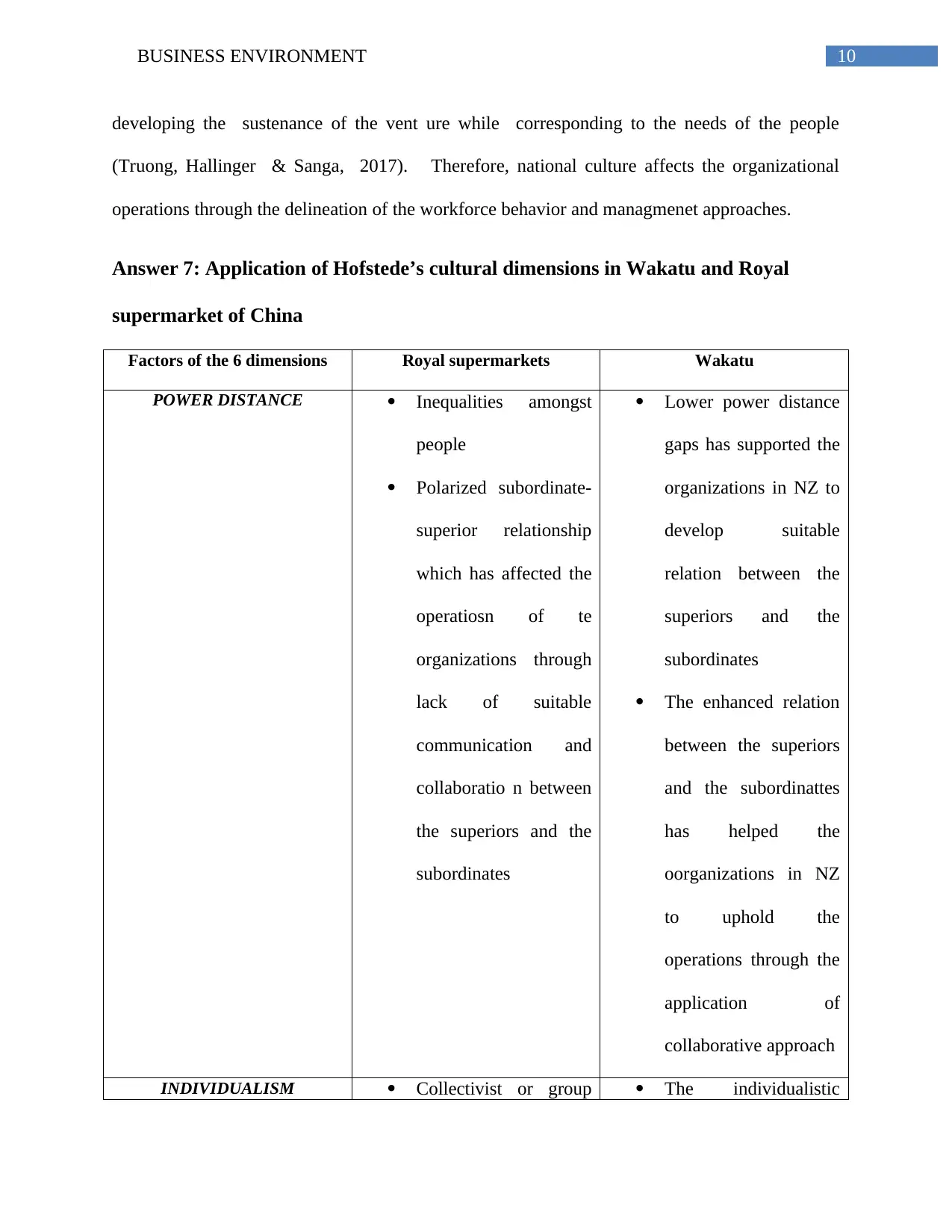
10BUSINESS ENVIRONMENT
developing the sustenance of the vent ure while corresponding to the needs of the people
(Truong, Hallinger & Sanga, 2017). Therefore, national culture affects the organizational
operations through the delineation of the workforce behavior and managmenet approaches.
Answer 7: Application of Hofstede’s cultural dimensions in Wakatu and Royal
supermarket of China
Factors of the 6 dimensions Royal supermarkets Wakatu
POWER DISTANCE Inequalities amongst
people
Polarized subordinate-
superior relationship
which has affected the
operatiosn of te
organizations through
lack of suitable
communication and
collaboratio n between
the superiors and the
subordinates
Lower power distance
gaps has supported the
organizations in NZ to
develop suitable
relation between the
superiors and the
subordinates
The enhanced relation
between the superiors
and the subordinattes
has helped the
oorganizations in NZ
to uphold the
operations through the
application of
collaborative approach
INDIVIDUALISM Collectivist or group The individualistic
developing the sustenance of the vent ure while corresponding to the needs of the people
(Truong, Hallinger & Sanga, 2017). Therefore, national culture affects the organizational
operations through the delineation of the workforce behavior and managmenet approaches.
Answer 7: Application of Hofstede’s cultural dimensions in Wakatu and Royal
supermarket of China
Factors of the 6 dimensions Royal supermarkets Wakatu
POWER DISTANCE Inequalities amongst
people
Polarized subordinate-
superior relationship
which has affected the
operatiosn of te
organizations through
lack of suitable
communication and
collaboratio n between
the superiors and the
subordinates
Lower power distance
gaps has supported the
organizations in NZ to
develop suitable
relation between the
superiors and the
subordinates
The enhanced relation
between the superiors
and the subordinattes
has helped the
oorganizations in NZ
to uphold the
operations through the
application of
collaborative approach
INDIVIDUALISM Collectivist or group The individualistic
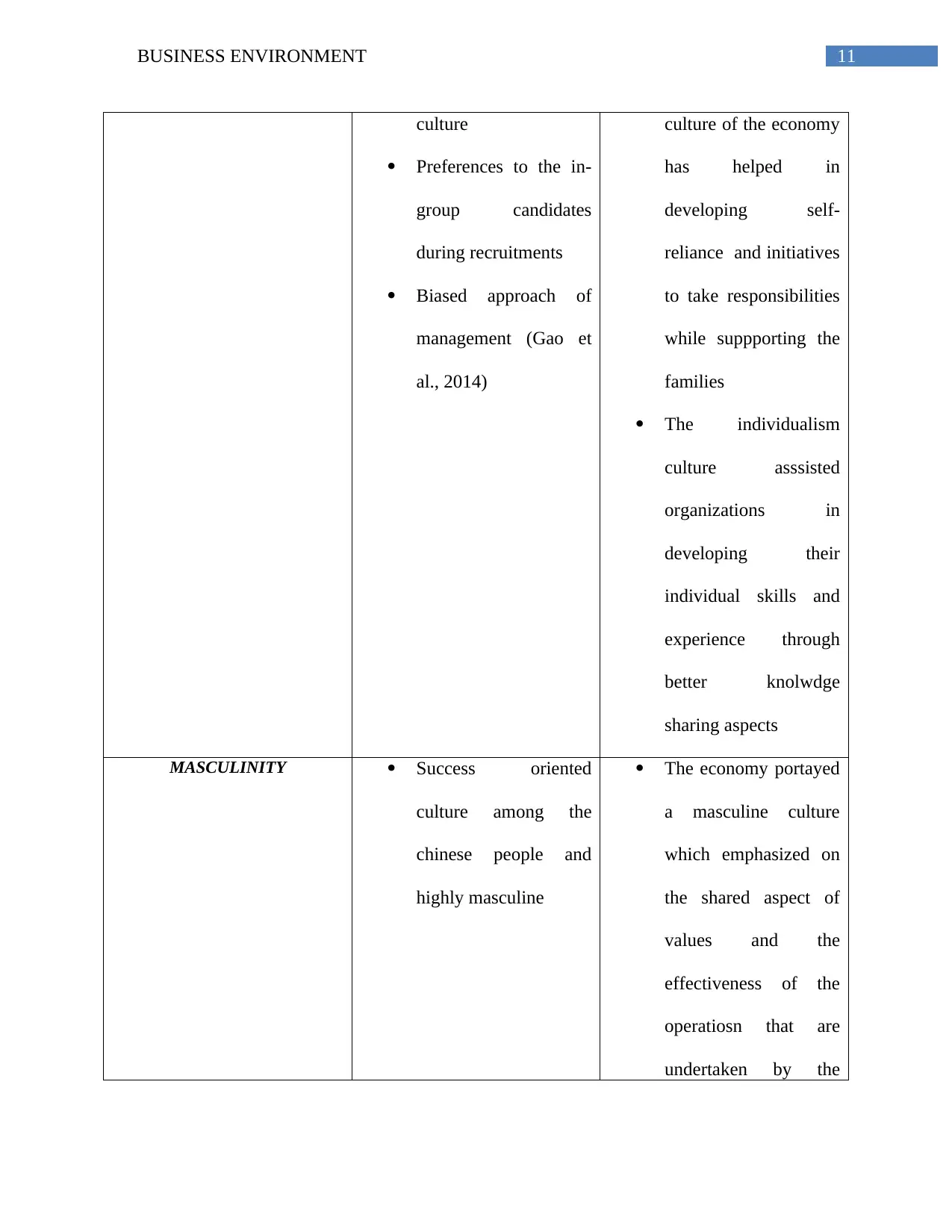
11BUSINESS ENVIRONMENT
culture
Preferences to the in-
group candidates
during recruitments
Biased approach of
management (Gao et
al., 2014)
culture of the economy
has helped in
developing self-
reliance and initiatives
to take responsibilities
while suppporting the
families
The individualism
culture asssisted
organizations in
developing their
individual skills and
experience through
better knolwdge
sharing aspects
MASCULINITY Success oriented
culture among the
chinese people and
highly masculine
The economy portayed
a masculine culture
which emphasized on
the shared aspect of
values and the
effectiveness of the
operatiosn that are
undertaken by the
culture
Preferences to the in-
group candidates
during recruitments
Biased approach of
management (Gao et
al., 2014)
culture of the economy
has helped in
developing self-
reliance and initiatives
to take responsibilities
while suppporting the
families
The individualism
culture asssisted
organizations in
developing their
individual skills and
experience through
better knolwdge
sharing aspects
MASCULINITY Success oriented
culture among the
chinese people and
highly masculine
The economy portayed
a masculine culture
which emphasized on
the shared aspect of
values and the
effectiveness of the
operatiosn that are
undertaken by the
⊘ This is a preview!⊘
Do you want full access?
Subscribe today to unlock all pages.

Trusted by 1+ million students worldwide
1 out of 22
Related Documents
Your All-in-One AI-Powered Toolkit for Academic Success.
+13062052269
info@desklib.com
Available 24*7 on WhatsApp / Email
![[object Object]](/_next/static/media/star-bottom.7253800d.svg)
Unlock your academic potential
Copyright © 2020–2026 A2Z Services. All Rights Reserved. Developed and managed by ZUCOL.





